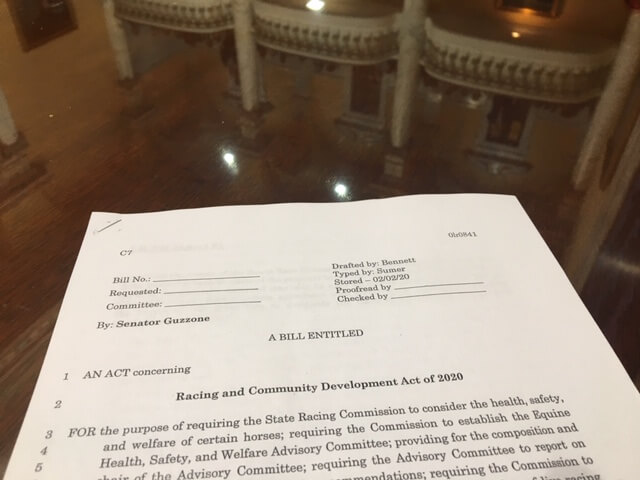Race Track Bill Eyes Gaming Proceeds, Not Education Funds

Sensitive to the backlash that could occur if tax revenues were used to prop up a distressed industry, backers of a measure to finance horse track improvements in Maryland have opted to use gaming proceeds — and not the state’s general fund.
Instead, they have offered a $375-million proposal to rehabilitate Pimlico Race Course in Baltimore and Laurel Park in Anne Arundel County, mostly through the issuance of 30-year bonds.
Senate Bill 987, the Racing and Community Development Act of 2020, would authorize the use of slot machine and lottery proceeds to finance that debt.
The measure is backed by Sen. Guy J. Guzzone (D-Howard), chairman of the Budget and Taxation Committee, and has 11 cosponsors, from both parties. It was filed just before the Senate’s 5 p.m. filing deadline on Monday.
“No monies will be taken from the Education Trust Fund to fund any portion of this bill,” the lawmaker said an interview on Tuesday.
The plan hatched by industry groups, the city and others last fall would authorize the Maryland Stadium Authority to spend $180 million to tear down and rebuild Pimlico, home of the Preakness, the second leg of racing’s Triple Crown.
The track would only be used for racing one month a year. Ballfields, a community center and other amenities would be available to the surrounding neighborhood the other 11 months of the year.
The authority would also handle a $155 million project to upgrade the aging grandstand, stables and worker housing at Laurel, the state’s main racing venue.
In a news release late Monday, Guzzone’s bill was praised by Baltimore City Mayor Bernard C. “Jack” Young (D), Anne Arundel County Executive Steuart Pittman (D) and The Stronach Group, which owns Pimlico, Laurel and the closed Bowie Training Center.
“The bill introduction is a critical step forward for Baltimore as it preserves the great tradition of Preakness at Pimlico and signals the commitment of significant investment in the Park Heights community,” Young said.
“Laurel Park is ideally situated to become not only a major entertainment destination and an economic driver for the state, but also the most horse-friendly racetrack and training facility in America,” said Pittman, who is a longtime and experienced horseman. “Passage of this legislation will make it happen.”
The measure appropriates $27 million in unspent funds from the Racetrack Facility Renewal Account, a source of gaming dollars already earmarked by law for industry use.
It would cost the state $17 million a year to repay the bonds needed to obtain the remaining $348 million. Guzzone’s bill utilizes three sources — the track improvement fund; the Purse Dedication Account, a fund to benefit the state’s horsemen; and slots proceeds earmarked for Baltimore.
Because the largest of the three funds sunsets in 2032, lawmakers had to find a replacement for that $8.5 million from 2033 to 2051, when the bonds will be fully paid off.
To do that, Guzzone’s bill advocates using lottery proceeds.
On Monday, Gov. Lawrence J. Hogan Jr. (R) said he would like to see the Preakness remain in Baltimore. But he told reporters that using education funding to finance track improvements would be “a terrible idea.”
Under the Senate bill, the Bowie Race Course Training Center would be made available for community use.
The portion along the Patuxent River would be transferred to the Maryland National Capital Park and Planning Commission for conversion to nature trails. The rest would be utilized by the City of Bowie and Bowie State University for ballfields and a gym.
“It’s a win-win for everybody,” said Sen. Douglas J.J. Peters (D-Prince George’s), chairman of a Budget and Taxation subcommittee.
In light of a rash of race horse deaths that have occurred around the country in recent years, the bill also creates a safety panel, the Equine Health, Safety, and Welfare Advisory Committee.
The bill-filing deadline in the House of Delegates is Friday, and House Speaker Adrienne A. Jones (D-Baltimore County) is expected to introduce legislation similar, though perhaps not identical, to Guzzone’s.
“I suspect it will be very close,” he said.




 Creative Commons Attribution
Creative Commons Attribution